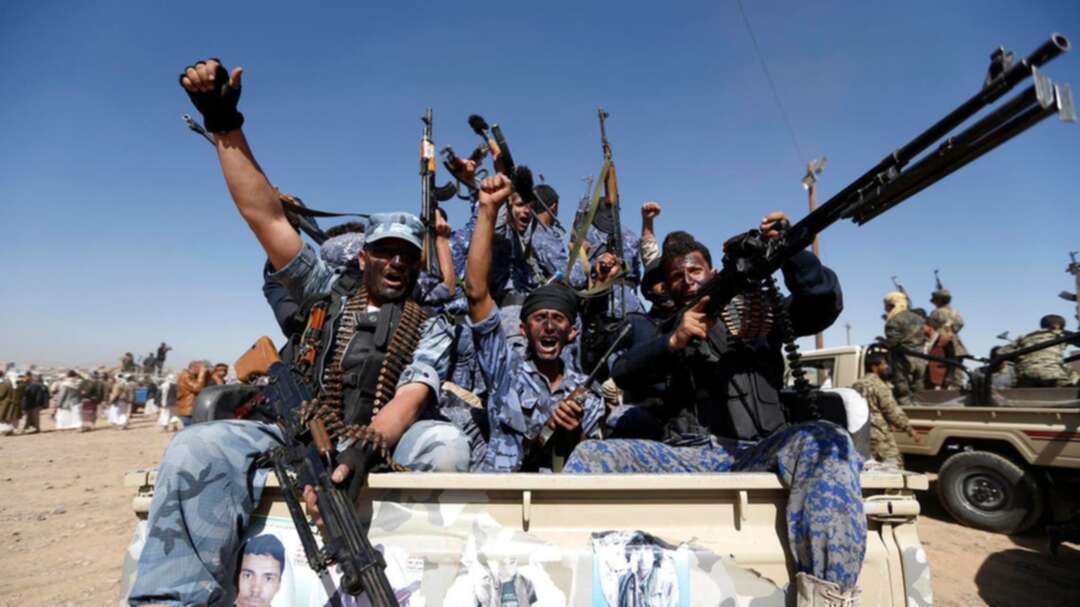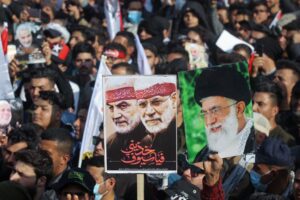-
Iran nuclear deal, easing sanctions did not curb Iran-backed militancy: Report

The 2015 Iran nuclear deal and the easing of sanctions on Tehran did not curb or moderate Iranian-backed militancy, according to a new report from the Tony Blair Institute for Global Change (TBI) who warned that IRGC-manufactured militia groups are currently the greatest threat to regional stability.
The latest report titled “ The View From Tehran: Iran's Militia Doctrine” and co-authored by TBI’s Saeid Golkar and Kasra Aarabi revealed that while economic sanctions on the Iranian regime have significantly weakened Iran’s already ailing economy, it has not altered the regime’s priorities.
https://twitter.com/AlArabiya_Eng/status/1360038067759964160
“The relationship between Tehran, the IRGC, and these manufactured groups is rooted in worldview, they have spent a lot of time indoctrinating and radicalizing these fighters,” Aarabi told Al Arabiya.
“So even if tensions are eased, or if Iran receives sanctions or sanctions are increased, then given the fact that this relationship is not based on material, but it is what based on worldview, these fighters will fight as warriors without borders, regardless of access to funds from Iran,” he added.The latest report released on Thursday coincides with an increased frequency of attacks from the Iran-backed Houthi militia group that on Tuesday, fired four explosives-laden drones on Saudi Arabia, attacked Saudi Arabia’s southern Abha International Airport and managed to set a civilian plane on fire day later on Wednesday and then fired a ballistic missile and two drone on the southern territories of the Kingdom 24 hours later.
https://twitter.com/AlArabiya_Eng/status/1360042016357437442
The increased number of attacks launched by the Houthis this past week comes after US Secretary of State Antony Blinken notified members of Congress of his intent to remove the Iran-backed Houthis from the US list of terrorist organizations.
According to a document obtained by Al Arabiya English, the US State Department intends to remove both the Houthi militia and three of its senior leaders from a terrorism list.
“The premise that Iran would moderate its commitment to creating and sponsoring militias due to the thaw in US-Iranian relations after the 2015 nuclear deal and sanctions relief for Tehran was false. The number of militias created by the IRGC surged after this period, and the Guard’s presence abroad peaked, with the Quds Force expanding its operations in Iraq, Syria and Yemen,” both TBI authors wrote in their report.
Aarabi said the report also points out Iran’s support for militia groups on a spectrum, specifically the IRGC’s role in helping those groups it has manufactured like Hezbollah in Lebanon to supporting grassroots groups with shared or tactical interests, from Hamas to the Taliban.
“There is a spectrum and we show this in the report from groups that are grassroots militias that have shared or tactical interests, such as the IRGC's relationship with the Taliban, for example. Or, on the other side of the spectrum, there are groups that have been manufactured and have ideological compliance, they have embraced Vilayat-e Faqih and they have embraced Khamenei as the supreme authority,” Aarabi, using the phrase in reference to the Shia Islamist principle that gives Iran’s supreme leader authority over Shia Muslims.
 Iraqi demonstrators lift a placards depicting Iraqi commander Abu Mahdi al-Muhandis (C) and Iranian Revolutionary Guards commander Qasem Soleimani (L) and Iran's Supreme Leader Ayatollah Ali Khamenei (R), in Tahrir square in the capital Baghdad on January 3, 2021. (AFP)
Iraqi demonstrators lift a placards depicting Iraqi commander Abu Mahdi al-Muhandis (C) and Iranian Revolutionary Guards commander Qasem Soleimani (L) and Iran's Supreme Leader Ayatollah Ali Khamenei (R), in Tahrir square in the capital Baghdad on January 3, 2021. (AFP)“Within this latter group, there is a spectrum. Groups that observe practical implementation of day to day Vilayat-e Faqih of Khamenei's practical will. They obviously have a much closer relationship with the IRGC and they receive more support and essentially more ideological compliance and more support from Teheran,” Aarabi said.
“It is these groups in particular that are going to be the hardest to dismantle and counter and they pose the greatest threat to stability in the Middle East,” he added.
source: Ismaeel Naar
Image source: AFP
Levant
You May Also Like
Popular Posts
Caricature
BENEFIT Sponsors BuildHer...
- April 23, 2025
BENEFIT, the Kingdom’s innovator and leading company in Fintech and electronic financial transactions service, has sponsored the BuildHer CityHack 2025 Hackathon, a two-day event spearheaded by the College of Engineering and Technology at the Royal University for Women (RUW).
Aimed at secondary school students, the event brought together a distinguished group of academic professionals and technology experts to mentor and inspire young participants.
More than 100 high school students from across the Kingdom of Bahrain took part in the hackathon, which featured an intensive programme of training workshops and hands-on sessions. These activities were tailored to enhance participants’ critical thinking, collaborative problem-solving, and team-building capabilities, while also encouraging the development of practical and sustainable solutions to contemporary challenges using modern technological tools.
BENEFIT’s Chief Executive Mr. Abdulwahed AlJanahi, commented: “Our support for this educational hackathon reflects our long-term strategic vision to nurture the talents of emerging national youth and empower the next generation of accomplished female leaders in technology. By fostering creativity and innovation, we aim to contribute meaningfully to Bahrain’s comprehensive development goals and align with the aspirations outlined in the Kingdom’s Vision 2030—an ambition in which BENEFIT plays a central role.”
Professor Riyadh Yousif Hamzah, President of the Royal University for Women, commented: “This initiative reflects our commitment to advancing women in STEM fields. We're cultivating a generation of creative, solution-driven female leaders who will drive national development. Our partnership with BENEFIT exemplifies the powerful synergy between academia and private sector in supporting educational innovation.”
Hanan Abdulla Hasan, Senior Manager, PR & Communication at BENEFIT, said: “We are honoured to collaborate with RUW in supporting this remarkable technology-focused event. It highlights our commitment to social responsibility, and our ongoing efforts to enhance the digital and innovation capabilities of young Bahraini women and foster their ability to harness technological tools in the service of a smarter, more sustainable future.”
For his part, Dr. Humam ElAgha, Acting Dean of the College of Engineering and Technology at the University, said: “BuildHer CityHack 2025 embodies our hands-on approach to education. By tackling real-world problems through creative thinking and sustainable solutions, we're preparing women to thrive in the knowledge economy – a cornerstone of the University's vision.”
opinion
Report
ads
Newsletter
Subscribe to our mailing list to get the new updates!






















